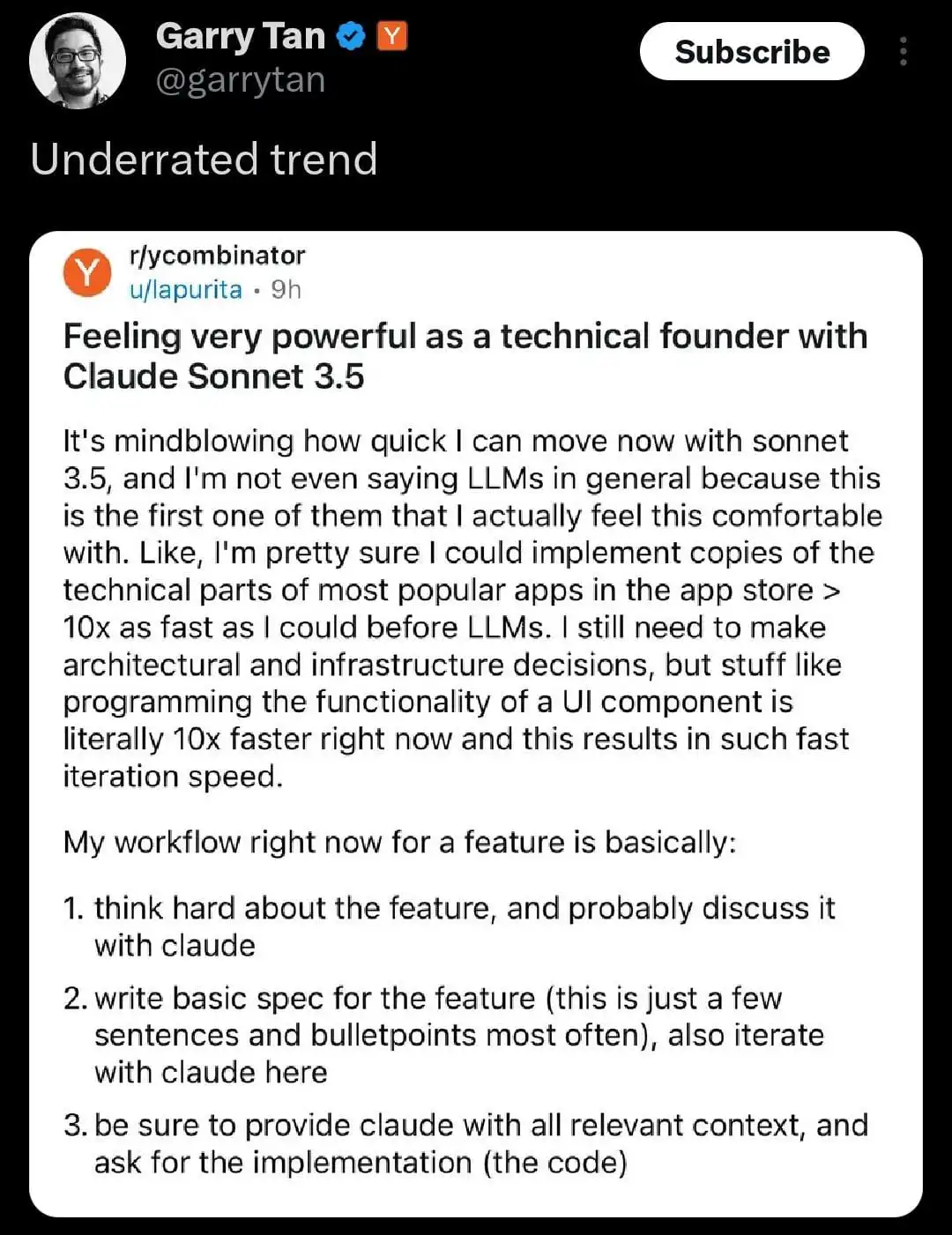The Delusion of AI-Powered Development: A Technical Reality Check
A scathing critique of the recent claims that AI tools like Claude 3.5 Sonnet can make developers '10x faster.' This blog post exposes the dangerous oversimplification of software engineering and explains why true innovation still requires human expertise.

In the ever-churning cesspool of tech hype, I thought I’d seen it all. But then, like a bolt of idiocy from the blue, this gem appeared on my Twitter feed:

Let’s pause for a moment to let the sheer absurdity of this claim sink in. Our intrepid “technical founder” is boldly proclaiming that with Claude Sonnet 3.5, they can implement copies of most popular apps’ technical parts ten times faster than before. Ten. Times. Faster.
As someone who’s spent years in the trenches of software development, wrestling with complex systems and debugging nightmares, I can confidently say this: What utter bollocks.
Let’s break down why this claim is not just wrong, but dangerously misguided. First off, the poster admits they still need to make architectural and infrastructure decisions. Well, no shit, Sherlock. These aren’t trivial matters you can offload to an AI, no matter how many parameters it’s been trained on. Choosing between a monolithic architecture and microservices, deciding on the right database technology, setting up load balancing and scalability measures - these are critical decisions that require deep technical knowledge and experience. No amount of prompt engineering is going to give you a system architecture that can handle millions of concurrent users without collapsing like a house of cards.
But oh, it gets better. Apparently, “programming the functionality of a UI component is literally 10x faster right now.” I’d love to see Claude try to implement a complex, stateful UI component that needs to handle asynchronous data fetching, manage global and local state, implement proper error boundaries, and maintain performance under heavy user interaction. Sure, maybe Claude can spit out some basic React components faster than you can type. But can it handle the intricate dance of component lifecycle methods, memoization for performance optimization, and the nuances of hooks and context? I think not.
And let’s talk about that workflow, shall we? “Think hard about the feature, and probably discuss it with Claude.” Oh, brilliant. Because AI is known for its deep understanding of business requirements, user needs, and the subtle trade-offs involved in feature design. I’m sure Claude will give you a thorough analysis of how your new feature will impact system performance, data consistency, and user privacy. It’ll probably throw in a detailed threat model analysis while it’s at it, right?
But wait, there’s more! “Write basic spec for the feature (this is just a few sentences and bullet points most often), also iterate with Claude here.” Fantastic. Because we all know that the best software is built on vague, handwavy specifications. Who needs detailed acceptance criteria, edge case analysis, or performance requirements? Just throw a few bullet points at Claude and watch the magic happen!
And the pièce de résistance: “Be sure to provide Claude with all relevant context, and ask for the implementation (the code).” Oh, of course! Because context in software development is just so simple and straightforward, isn’t it? I’m sure Claude will intuitively understand your entire tech stack, the quirks of your legacy systems, the specific performance constraints of your infrastructure, and the Byzantine complexity of your business logic. And it’ll seamlessly integrate all of this into perfectly crafted, production-ready code. Give me a break.
Let’s get real for a moment. Building robust, scalable software systems is hard. It’s not just about churning out lines of code as quickly as possible. It’s about understanding complex problems, designing elegant solutions, and implementing them in a way that’s maintainable, performant, and secure. It’s about handling edge cases that you didn’t even know existed until your app crashed in production at 2 AM. It’s about optimizing database queries that are bringing your servers to their knees under load. It’s about debugging race conditions in your concurrent code that only appear once in a blue moon but cause catastrophic data corruption when they do.
These are the challenges that separate the wheat from the chaff in software engineering. And they’re challenges that no AI, no matter how advanced, can solve for you. An AI can’t understand the subtle implications of choosing one caching strategy over another. It can’t anticipate how your code will behave under real-world conditions with unpredictable user behavior and unreliable network connections. And it certainly can’t navigate the murky waters of technical debt and system evolution that every long-lived software project must contend with.
The dangerous illusion being peddled here is that software development is nothing more than stringing together syntax. That if you can just describe what you want clearly enough, an AI will magically produce flawless, production-ready code. This is a fantasy, plain and simple. It’s a fantasy that undermines the years of experience, the deep technical knowledge, and the hard-won lessons that real software engineers bring to the table.
Don’t get me wrong - AI tools like Claude can be useful. They can help with code completion, explain unfamiliar concepts, or even generate boilerplate code. But they are not a substitute for human expertise and creativity in software engineering. They’re not going to make you a “10x developer” overnight, and they’re certainly not going to allow non-technical founders to build complex, scalable tech products without a deep understanding of software engineering principles.
So the next time you see someone claiming that AI is revolutionizing software development to this degree, take it with a mountain-sized grain of salt. The reality of our field is far more complex, challenging, and yes, rewarding than these oversimplified narratives suggest. True innovation in software comes from human creativity, deep technical understanding, and the ability to solve complex problems in elegant ways. And that, my friends, is something no AI can replicate - no matter how many tokens it’s been trained on.
